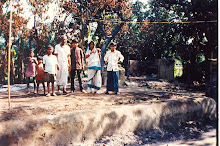Daily Star Dhaka April 24, 2014
Jhathibhanga massacre day observed in Thakurgaon
Families of martyrs demand
punishment for killers
Our Correspondent, Thakugaon
Women, left widowed by the brutal killing of their husbands at
the hands of Pakistan occupation army and their local collaborators on April
23, 1971, join a mourning procession at Jagannathpur in Thakurgaon Sadar
upazila yesterday marking Jhathibhanga massacre day. PHOTO: STAR
Locals observed Jhathibhanga
massacre day at Jagannathpur village under Thakurgaon Sadar upazila with
different programmes yesterday.
On April 23 in 1971, thousands of people from Jagannathpur, Gorea, Shukanpokhori, and Balia unions under Sadar upazila left their home for India to save their lives from the Pakistani occupation army and their local collaborators known as Razakars.
As the people, mostly belonging to minority Hindu community, gathered at Jhathibhanga village in Sadar upazila, Pakistani soldiers, informed by Razakars and Al Badars, rushed to the spot and killed about 3,000 people and buried them at a mass grave there.
To mark the day, locals under the banner of Jhathibhanga Ganahatya Dibash Palan Committee brought out a condolence procession, followed by a discussion on the premises of Jagannathpur Government Primary School.
Over a hundred women who lost their husbands and a good number of people who lost their fathers during the mass killing on April 23 in 1971 attended the programme.
They demanded immediate arrest, trial and exemplary punishment to the killers of their husbands.
Among others, journalist Abdul Latif, former member of Jagannathpur Union Parishad Dhani Charan, Giren Chandra widow Shushila Bewa, Pobanshori and Roshni Rani, addressed the meeting with freedom fighter Dr Nipendranath in the chair.
Even after 43 years of the Liberation War, the Razakars who were involved with the killing are moving freely and many of them have become the influential members of the society, speakers said at the programme.
"We decided to cross the border for refuge in India as it was not safe to live in the area," said eyewitness Dhani Charan.
"When we reached Jhathibhanga village, the sun was setting and we decided to stay for the night there and start next morning.
But the Razakars of the area came to know the matter and immediately informed the Pakistani army. A contingent of the Pakistani army rushed to the area and encircled the hapless innocent people.
Later the collaborators asked the male members of the minority community to stand in queues.
The Pakistani soldiers and their collaborators killed around 3,000 people that day, said Dhani.
Several women including Pabanshori, Gothan Bala and Roshni Rani, who were eyewitnesses to the carnage, also recalled the horrific story of the massacre at Jathibhanga.
On April 23 in 1971, thousands of people from Jagannathpur, Gorea, Shukanpokhori, and Balia unions under Sadar upazila left their home for India to save their lives from the Pakistani occupation army and their local collaborators known as Razakars.
As the people, mostly belonging to minority Hindu community, gathered at Jhathibhanga village in Sadar upazila, Pakistani soldiers, informed by Razakars and Al Badars, rushed to the spot and killed about 3,000 people and buried them at a mass grave there.
To mark the day, locals under the banner of Jhathibhanga Ganahatya Dibash Palan Committee brought out a condolence procession, followed by a discussion on the premises of Jagannathpur Government Primary School.
Over a hundred women who lost their husbands and a good number of people who lost their fathers during the mass killing on April 23 in 1971 attended the programme.
They demanded immediate arrest, trial and exemplary punishment to the killers of their husbands.
Among others, journalist Abdul Latif, former member of Jagannathpur Union Parishad Dhani Charan, Giren Chandra widow Shushila Bewa, Pobanshori and Roshni Rani, addressed the meeting with freedom fighter Dr Nipendranath in the chair.
Even after 43 years of the Liberation War, the Razakars who were involved with the killing are moving freely and many of them have become the influential members of the society, speakers said at the programme.
"We decided to cross the border for refuge in India as it was not safe to live in the area," said eyewitness Dhani Charan.
"When we reached Jhathibhanga village, the sun was setting and we decided to stay for the night there and start next morning.
But the Razakars of the area came to know the matter and immediately informed the Pakistani army. A contingent of the Pakistani army rushed to the area and encircled the hapless innocent people.
Later the collaborators asked the male members of the minority community to stand in queues.
The Pakistani soldiers and their collaborators killed around 3,000 people that day, said Dhani.
Several women including Pabanshori, Gothan Bala and Roshni Rani, who were eyewitnesses to the carnage, also recalled the horrific story of the massacre at Jathibhanga.
Published: 12:01 am Thursday, April 24, 2014


No comments:
Post a Comment